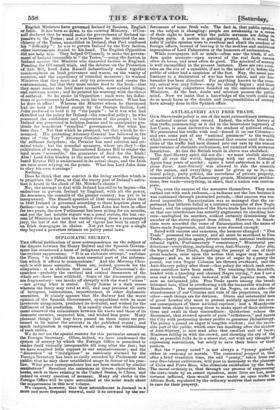ANTI-SLAVERY AND FREE TRADE.
Oun Slave-trade policy is one of the most extraordinary instances of national caprice upon record. Indeed, the whole history of that traffic, commencing as it did in the benevolent ingenuity of Las Cases, is most instructive to the student of political ethics. We prosecuted the traffic with zeal—forced it on our Colonies— and owe some part of our "national greatness" to the wealth which accrued from it. We continued that course until the atro- cities of the traffic had been dinned into our ears by the utmost perseverance of obstinate enthusiasm, not unmixed with sectarian fanaticism. At last the British trade in slaves was abolished.
The Anti-Slavery spirit did not die : we must abolish slavery itself all over the world, beginning with our own Colonies. Again long years of apathy; again a total subjection to a fit of pious furor. Anti-Slavery was allowed to rule the councils of the nation, and everything must be given up to it,—na- tional policy, party politics, the sacredness of private property, commercial interests, Parliamentary grants, Ministerial predilec- tions, free trade—everything, in short, that a nation can contem- plate.
Yea, even the success of the measures themselves. They were carried out with such rashness,—a rashness not the less because it was continued through protracted periods,—that success was ren- dered impossible. Emancipation was so managed' that the ex- periment has hitherto failed as a national exemplar of free Negro labour; and the suppression of the Slave-trade has been so carried on that our interference has actually augmented its shocking hor- rors—multiplied its murders, without certainly diminishing the number of the slaves shipped from Africa. However, to fanati- cism were accorded the name of Emancipation. and the name of Slave-trade Suppression, and those were deemed enough.
Sated with success and sameness, the humour changed : " Free Trade" possessed the country, and all must be sacrificed to Free Trade,—party politics again, private interests, national traditions, colonial rights, Parliamentary "consistency," Ministerial pre- dilections—everything, including even Anti-Slavery. Inter alt's, the bigots of Free Trade, forgetting the precept of one of their great teachers, seize upon the notion that sugar may be made cheaper ; and so, to reduce the price of sugar by a penny the pound, our own Sugar Colonies are thrown overboard, and the Anti-Slavery policy after them—that policy for which such enor- mous sacrifices have been made. The touching little handbills, beaded with a kneeling and chained Negro crying, " Am I not a man and a brother," once bedewed with the popular tears, are now an antiquated joke. Free Trade sports among the broad- brimmed hats, filled to overflowing with the inexorable wisdom of Manchester. The regeneration of the Negro, on one side—the abandonment of our Colonies and ruin of the proprietors, on the other—such things are for derision. Grave and substantial men of great London city meet to protest publicly against the ruin- ous consequences of these national caprices ; and a Manchester broad-brim skims in among them to make sport of their delibera- tions and exult in their discomfiture : Quakerism echoes the Economist, that avowed apostle of pure "selfishness," and taunts the City with postponing money profits to generous philanthropy. The penny a pound on sugar is tangible wisdom; and the move- able part of the public, which once ran headlong after the shadow of Anti-Slavery, is now mad after that smallest unit of lucre; Ministers falling in with the crowd, and shouting the cry of the day, as peaceful folks do in a street riot, not with any thought of expressing convictions, but solely to save their bones or their pockets.
But the " penny saved " is not always a "penny gained," either in economy or morals. The economical prospect is, that after a brief transition time, the odd "penny," taken from our own free-labour cultivators, will pass in monopoly to the planters of Cuba and Porto Rico, who stimulate cultivation by the lash. The moral certainty is) that through our process of suppressing the slave-trade by an armed squadron, more lives are lost, more tortures inflicted, than would accrue under an open traffic in African flesh, regulated by the ordinary motives that induce men to care for their property.


























 Previous page
Previous page